The Bachelor of Arts (Fine Art) is moving to a two-stage enrolment process in 2018. In stage one, you will enrol online in your courses for semesters one and two 2018. In stage two, you will select your semester one classes for Fine Art Studio, Workshop and ART: History+Theory+Cultures 2018.
This page will assist you with stage two of the enrolment process. Here you will find a list of potential Fine Art Studio classes. (Note: There is a separate page for Workshop classes and a separate page for ART: History+Theory+Cultures classes.) You will only take one Fine Art Studio class, but you need to list three (3) preferences. Read the list below carefully and select three Fine Art Studio classes you would be happy to enrol in for semester one. Remember these Fine Art Studio classes are 24 credit point courses and will require 6 contact hours per week. These classes will all run under the following course codes:
Fine Art Studio 3 VART 3646 (2nd year)
Fine Art Studio 5 VART 3648 (3rd year)
In February 2018, we will post a link to a google form on this page so that you can nominate your preferred Fine Art Studio classes. The form will have three (3) drop-down menus with the following classes listed. You will need to nominate your first, second and third Fine Art Studio class preference.
IMPORTANT – You must not repeat any class in your preference lists. Every effort will be made to place you in your first preference classes.
Course Information
Offering Studio

Image Credit: Robin Kingston, Bundoora Lobby detail, 2017, Acrylic on the wall, Image Courtesy of the artist ©Robin Kingston
Abstraction THIS STUDIO IS FULL
This course draws on the rich and diverse field of predominantly western abstract art as it relates to contemporary art practice. The course investigates ideas and language relating to non-objective and abstract art through the development of a body of exploratory and experimental artworks whilst unfolding issues in historical and contemporary abstraction. Emphasis will be placed on how artists generate and develop ideas that are used to make contemporary abstract artworks. The course will be delivered primarily through group tutorials, where you will present your artworks for critical review by your peers and teaching staff. This will be supported by class discussions and student presentations that focus on supporting the development of a body of exploratory and experimental artworks relating to your individual interests and interpretation of the course thematic. You will be encouraged to find your own way to draw from this rich field of research and interpret ideas as it relates to your own individual art practice
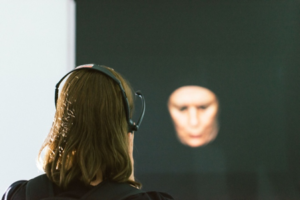
Image Credit: Courtesy of Keelan O’Hehir 2016
Articulating Print Practice - THIS STUDIO IS FULL
Within this course you will learn how to articulate your concepts and ideas through print theories, related materials and methods of production. You will acquire a capacity to formulate and articulate a conceptual foundation for your art practice, and to make appropriate decisions as to which mediums and presentation methods best translate your conceptual premise.
Through group presentations and individual tutorials, you will establish a capacity for identifying not only the strengths and possibilities, but also areas for improvement, in both your own and fellow students’ art practice. You will be instructed in how to articulate these both verbally, and in written form. You will continue to refine your technical skills in order to produce a resolved body of work, as well as develop an understanding of the possibilities offered by the expanded nature of print media and its various positions within contemporary art practice.
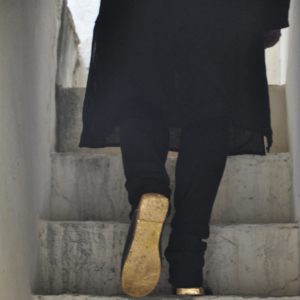
Rhett D’Costa, Ambulation, 2017, Inkjet photographic print, Image courtesy of the artist © Rhett D’Costa
Culture & Identity - THIS STUDIO IS FULL
This course draws on the rich and diverse field of culture and identity as it relates to contemporary art practice. Both words ‘culture’ and ‘identity’, potentially traverse a range of issues ranging from the social, personal, historical, geographic and the political. The field, which this course navigates, is complex and extremely relevant to contemporary art. Artists have an important role to play in interrogating and shaping this discourse. The course will be delivered primarily through group tutorials, where you will present your artworks for critical review by your peers and teaching staff. This will be supported by class discussions and student presentations that focus on supporting the development of a body of exploratory and experimental artworks relating to your individual interests and interpretation of the course thematic. You will be encouraged to find your own way to draw from this rich field of research and interpret ideas as it relates to your own individual art practice.
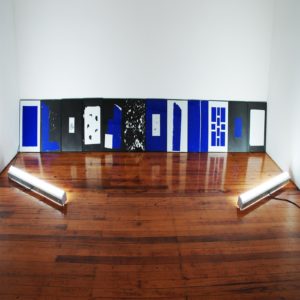
Image Credit: Phil Edwards, Untitled Installation, 2015, Photographic Documentation, Image courtesy of the artist, Copyright: Phil Edwards
Expanded Painting -THIS STUDIO IS FULL
In this course, you will use the historical context of painting and its relationship to the environment, domesticity and public institutions to develop a series of works that integrate traditional painting techniques with installation practice. The course aims to explore the role of art in critiquing the relationship of the individual in a broader societal context. The use of metaphor and allegory are integral to this studio experimentation. You will explore conceptual concerns and contemporary theory appropriate to your individual studio exploration. Painting and installation will be explored through materiality, time, location, the role of documentation and of multi-media through process based projects. You will be encouraged to develop a strong, sustainable working process through your own individualised visual research, leading to a group of experimental and resolved works in media appropriate to your individual projects. You will develop an individualized studio practice where you will build upon your strengths thorough supportive, individual and group tutorials.
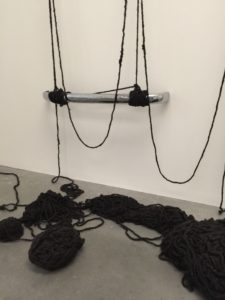
Image Credit: Sheela Gowda, Behold, 2009, Human Hair and Car Bumpers, Collection TATE Modern London UK, Photography Peter Ellis
Expanded Practices
This course is designed to develop your individual studio work through an exploration of the diversity of contemporary painting, drawing and media. Stimulated by a series of visual lectures and propositions, you will develop works that are inclusive of current conceptual and material issues, such as expansive painting and drawing, installation, narrative, image and object, abstraction and figuration and the moving image. Building upon your strengths, you will be encouraged to develop a strong, sustainable working process through your own individualised visual research, leading to a group of resolved works in media appropriate to your individual projects. Experimentation and play with concepts, materials, techniques and processes is encouraged to develop new ways of reflecting on and critiquing your practice. Supportive individual and group tutorials, lectures, gallery visits and demonstrations complement this course. The aim is to locate your work within the emerging field of fine art and develop a way of working that will sustain an advanced practice
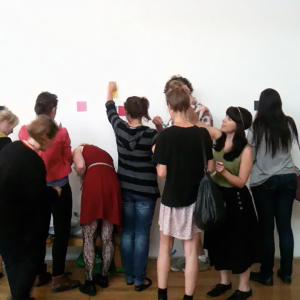
Image Credit: Student group drawing. Photography Greg Creek
Global Drawing Studio: Networks for Exchange and Exhibition
In this course, you will explore collaborative drawing with international student peers as an extension of your studio-based practice. You will test initial ideas and share approaches with individuals or groups of students with similar interests to devise a drawing exchange resulting in works being exhibited at RMIT and elsewhere. As examples, you might contribute to and exchange a shared sketchbook by mail several times over the semester, or you might communicate designs for a wall drawing that is completed by your partner(s) on site, or you might devise instructions for a performed drawing event. You can expect to devote 20% of this course to shared activities and 80% to developing your studio work informed by ideas raised by your experiences. You will be encouraged to develop a strong sustainable working process through your own individualised visual research and individual projects. Experimentation and play with concepts, materials, techniques and processes is encouraged to develop new ways of reflecting on and critiquing your practice. Supportive individual and group tutorials, lectures, gallery visits and demonstrations complement this course. Objectives are to consolidate and extend your emerging self-directed practice and potentially develop ongoing contacts with students from other countries. You will examine ideas of authorship within art practice leading to a deeper understanding of relations between the locations of making and meaning.
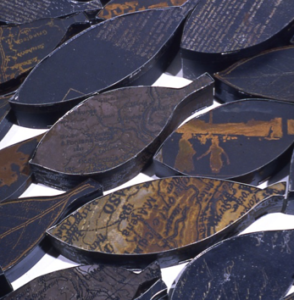
Image Credit: Kirsten Haydon, Woven Stories, 2002, tinplate, transfer
Gold & Silversmithing Narratives - THIS STUDIO IS FULL
In this course, you will undertake a series of creative projects where you will explore how narrative can be used as the focal point in creating Jewellery and Objects. You will investigate different ways to explore narrative to develop a personal methodology of story telling. Initial project development will involve research through the collection of literary and visual resources and synthesise of this material into experimental and explorative drawing and collage processes. In this course you will also be introduced to how colour can be applied to metal through various enamelling techniques. You look at how translucency, opacity and vitreous surface qualities can contribute to the conceptual intention of the work. At the completion of the semester you will have produced a body of jewellery, object and enamel works.

Image credit: Yayoi Kusama, Infinity Room, 2015, Helsinki Art Museum (CC)
Installation Art
In this course you will explore installation as spatial practice. You will examine installation as a hybrid form that negotiates boundaries of traditional art practices such as painting, sculpture, live art, video, film and theatre. This course focuses on the history and critical reception of installation as a practice. You will investigate how conceptual, spatial and material needs define the language and application of installation art. Installation art has been a dominant mode since the 1960’s and over that time has evolved to continually reflect contemporary culture. This course will investigate the role of the artist as viewer in determining the presentation mode and how this has changed. The artist, through the process of installing their work in a gallery or museum, places the studio in the museum. We will be exploring how this process activates the viewer as a performer within the artists’ work. The artist by working in the museum context is locked into engaging in many of its conventions as described in Inside the White Cube by Brian O’Doherty. How architectural space functions in the presence of the artwork will be an important consideration of this course.

Image Credit: David Clarke, Uwe, 2012
Object Making and Material
In this course, you will will undertake a semester long research project to produce a research archive as well as a body of jewellery/ceramic/object works that respond to this research. You will extensively research an area of direct interest to you and your gold and silversmithing and ceramic practice. You will encompass your research into finished work. This course will assist in developing your ability to conduct and document research that is integral to the ongoing practice in all creative disciplines. You will choose a topic that is relevant to the current direction of your work and that will engage you physically and mentally. It is possible that this will lead directly into future ceramic or gold and silversmithing studio work.
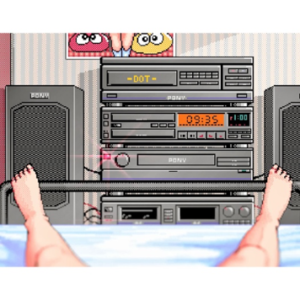
Image Credit: Jon Rafman (Still life) Beta Male, 2013, video, FACT (Foundation of Art and Creative Technology)
Post Internet Art
In this course you will explore how the impact of the internet has transformed notions of contemporary art practices acknowledging the profound socio-cultural effects that has resulted from the conflation of everyday life and the internet.
During the semester you will be introduced, and ask to respond to, the following ideas:
- How are artists exploring the physicalization of ‘immaterial’ digital structures and the transmutation of contemporary art practices into new definitions, forms and mediums.
- How has the status and currency of the image shifted from a fixed entity to a distributed one.
- How have other contemporary discourses and practices like Post-contemporary art and the New Aesthetic had an impact on art thinking and making together with Post internet art.
- How has the immaterial digital world impacted on more traditional media like painting, print, drawing where Guthrie Lonergan points out – “the photo of the art object is more widely dispersed [&] viewed than the object itself”.
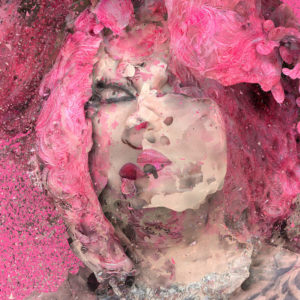
Still from Virtual Drag by Alison Bennett, Megan Beckwith & Mark Payne
Print as Other: Gender and Queer Strategies for Art Production
In this course, you will engage with contemporary art practices that deploy ‘otherness’ as a point of departure, with specific attention to gender and queer discourses that generate spaces beyond arbitrary cultural norms. You will focus on reproductive technologies such as printmaking and photography that challenge the status of the unique art object and have associations with feminine and feminist values.
In this context, you will be challenged to research other practitioners' methodologies and experiment with processes beyond your current practice. You will be directed to appropriate resources and instructed in divergent methods sensitive to the needs of your practice. You will participate in group critique sessions as well as individual tutorials to assist you in contextualising your work in relation to historic and contemporary art practices that engage with positions of ‘otherness’. You will develop a strong folio of work and transition towards becoming a self-managed art professional.
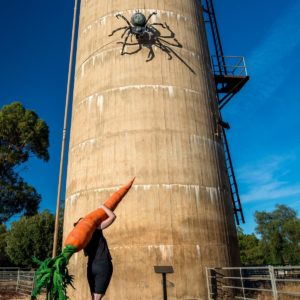
Image Credit: Snowman Killer by Clare McCracken, 2017. A performance work exploring the relationship between rural and urban Australia through Big Things. Photograph by Andrew Ferri
Re-Mapping the City - THIS STUDIO IS CANCELLED
How does your practice relate to the city and data? What data do we have access to about our city? How can artists engage with data in the public realm? This studio is designed to explore and translate the city artistically by responding to diverse data generated about the city by researchers in the school of Global, Urban and Social Studies (GUSS). Explore data and what it means to you as an artist, how it relates to creative processes and modes of your art practice, what it reveals about our city. You will be encouraged to explore how representation translates through modes of performance, photography, visual rendering, gold and silver-smithing, installation and sound in the public realm. Works generated through this studio will be professional and competitively pitched for publication in a collaboration with a GUSS studio. The course will attract artists interested in performance, photography, visual rendering, gold and silversmithing, installation and sound.
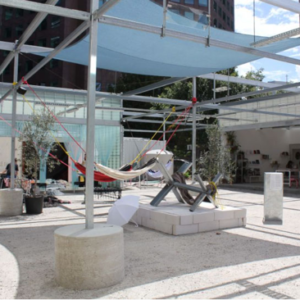
Image Credit: Scenes from artist collective While the Hour — Restival setup, Testing Grounds 2017
Testing Grounds
In this course you will examine project based art practices that exist beyond the studio, engaging concepts and practices that critique the nexus between sites of production and display. This course will take place partly at the Testing Grounds site and will comprise of a combination of weekly classes and intensive workshops culminating in a student-led live event/exhibition. Testing Grounds is a temporary space for creative practices encompassing art, performance and design, encouraging interdisciplinary practice, experimentation and calculated risk, Testing Grounds is a place where people at all levels can test, develop and share their work. http://www.testing-grounds.com.au/article/facilities-gallery/
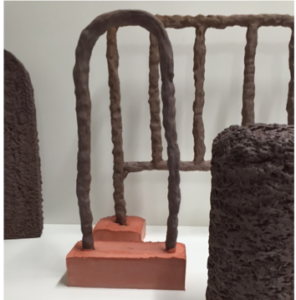
Image Credit: Caelan Renfree Dyer, Untitled, 2017, clay and plaster
The Narrative Through Clay
In this course, you will undertake a series of creative projects where you will explore how the ceramic object can convey narrative. You will investigate different narrative modes, which will include retelling personal experience through making, using literature sources as instigation and portraying character through ceramic based works. Initial project development will involve research through the collection of literary and visual resources, as well as experimental and explorative drawing processes. You will engage with a variety of different ceramic processes to begin to develop a personal methodology of making. At the completion of the semester you will have produced a body of ceramic works.
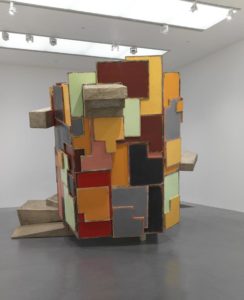
Image credit: Phylidda Barlow, untitled: upturnedhouse, 2012, softwood, plywood, hardboard, steel, expanded polyurethane foam, cement render, paint. Collection Tate / National Galleries of Scotland
Thinking Through Making in Sculpture -THIS STUDIO IS FULL
This course aims to further develop your Sculptural practice by focusing on an individual and hands-on approach to making. You will begin the course by creating and documenting a series of works without predetermined outcomes. This will allow you to be productive in an intuitive and creative way and build a deeper understanding of your own interests. In response to this work, you will research and document a series of artists, works and themes or ideas and begin to build an archive of research material to draw on in the future. In the second half of the course you will use these early works, research materials and ideas to develop and present a major work or series of works. This course aims to provide you with the tools to consolidate your work to date and to assist you in developing directions that you can potentially expand on as a professional artist or in further study.
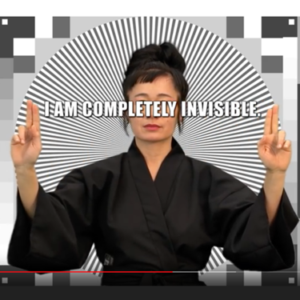
Image Credit: Hito Steyerl – How Not to Be Seen...MOV File 2013 video still, Tate Modern.
Time Based Practice
In this course you will explore processes which use duration and/or the manipulation of time as an essential element engaging with mediums such as video, sound, performance, improvisation and live and generative art. During the semester you will develop works that consider the sequential methodologies of Time-based practice in the form of; event, capture, process, display, and archive - though not always in this order. You will be asked to consider what it means to experience/listen/watch an artwork unfold over time according to the temporal logic of the medium and also to engage in the historical and cultural legacy of this genre. Building upon your strengths, you will be encouraged to develop a strong sustainable working process through your own individualised creative research, leading to a group of resolved works a format appropriate to your individual projects. Experimentation and play with time-based concepts, techniques and processes is encouraged to develop new ways of reflecting on and critiquing your practice. Supportive individual and group tutorials, lectures, collaborative workshops, technical demonstrations and individual studio work complement this course.